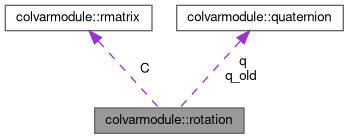A rotation between two sets of coordinates (for the moment a wrapper for colvarmodule::quaternion)
More...
#include <colvartypes.h>
|
|
cvm::real * | get_S () |
| |
|
cvm::real * | get_eigenvectors () |
| |
|
cvm::real * | get_eigenvalues () |
| |
|
cvm::quaternion * | get_q () |
| |
|
cvm::real * | get_S_backup () |
| |
|
cvm::rmatrix * | get_C () |
| |
| void | debug_gradients (cvm::rotation &rot, const cvm::ag_vector_real_t &pos1, const cvm::ag_vector_real_t &pos2, const size_t num_atoms_pos1, const size_t num_atoms_pos2) |
| | Function for debugging gradients. More...
|
| |
| void | calc_optimal_rotation (std::vector< atom_pos > const &pos1, std::vector< atom_pos > const &pos2) |
| | Calculate the optimal rotation and store the corresponding eigenvalue and eigenvector in the arguments l0 and q0; if the gradients have been previously requested, calculate them as well. More...
|
| |
|
void | calc_optimal_rotation_soa (cvm::ag_vector_real_t const &pos1, cvm::ag_vector_real_t const &pos2, const size_t num_atoms_pos1, const size_t num_atoms_pos2) |
| |
|
int | init () |
| | Initialize member data.
|
| |
|
| rotation () |
| | Default constructor.
|
| |
|
| rotation (cvm::quaternion const &qi) |
| | Constructor after a quaternion.
|
| |
|
| rotation (cvm::real angle, cvm::rvector const &axis) |
| | Constructor after an axis of rotation and an angle (in radians)
|
| |
|
| ~rotation () |
| | Destructor.
|
| |
|
cvm::rvector | rotate (cvm::rvector const &v) const |
| | Return the rotated vector.
|
| |
|
cvm::rotation | inverse () const |
| | Return the inverse of this rotation.
|
| |
|
cvm::rmatrix | matrix () const |
| | Return the associated 3x3 matrix.
|
| |
|
cvm::real | spin_angle (cvm::rvector const &axis) const |
| | Return the spin angle (in degrees) with respect to the provided axis (which MUST be normalized)
|
| |
|
cvm::quaternion | dspin_angle_dq (cvm::rvector const &axis) const |
| | Return the derivative of the spin angle with respect to the quaternion.
|
| |
|
cvm::real | cos_theta (cvm::rvector const &axis) const |
| | Return the projection of the orientation vector onto a predefined axis.
|
| |
|
cvm::quaternion | dcos_theta_dq (cvm::rvector const &axis) const |
| | Return the derivative of the tilt wrt the quaternion.
|
| |
|
|
bool | b_debug_gradients |
| | Perform gradient tests.
|
| |
|
cvm::quaternion | q {1.0, 0.0, 0.0, 0.0} |
| | The rotation itself (implemented as a quaternion)
|
| |
|
|
static bool | monitor_crossings = false |
| | Whether to test for eigenvalue crossing.
|
| |
|
static cvm::real | crossing_threshold = 1.0E-02 |
| | Threshold for the eigenvalue crossing test.
|
| |
|
|
void | build_correlation_matrix (std::vector< cvm::atom_pos > const &pos1, std::vector< cvm::atom_pos > const &pos2) |
| | Build the correlation matrix C (used by calc_optimal_rotation())
|
| |
|
void | calc_optimal_rotation_impl () |
| | Actual implementation of calc_optimal_rotation (and called by it)
|
| |
|
void | compute_overlap_matrix () |
| | Compute the overlap matrix S (used by calc_optimal_rotation())
|
| |
|
|
cvm::quaternion | q_old |
| | Previous value of the rotation (used to warn the user when the structure changes too much, and there may be an eigenvalue crossing)
|
| |
|
void * | jacobi |
| | Pointer to instance of Jacobi solver.
|
| |
|
|
struct | rotation_derivative |
| |
|
class | cvm::atom_group |
| |
A rotation between two sets of coordinates (for the moment a wrapper for colvarmodule::quaternion)
◆ calc_optimal_rotation()
| void colvarmodule::rotation::calc_optimal_rotation |
( |
std::vector< atom_pos > const & |
pos1, |
|
|
std::vector< atom_pos > const & |
pos2 |
|
) |
| |
Calculate the optimal rotation and store the corresponding eigenvalue and eigenvector in the arguments l0 and q0; if the gradients have been previously requested, calculate them as well.
The method to derive the optimal rotation is defined in: Coutsias EA, Seok C, Dill KA. Using quaternions to calculate RMSD. J Comput Chem. 25(15):1849-57 (2004) DOI: 10.1002/jcc.20110 PubMed: 15376254
◆ debug_gradients()
| void colvarmodule::rotation::debug_gradients |
( |
cvm::rotation & |
rot, |
|
|
const cvm::ag_vector_real_t & |
pos1, |
|
|
const cvm::ag_vector_real_t & |
pos2, |
|
|
const size_t |
num_atoms_pos1, |
|
|
const size_t |
num_atoms_pos2 |
|
) |
| |
Function for debugging gradients.
- Parameters
-
| [in] | pos1 | Atom positions of group 1 in SOA (in xxxyyyzzz order) |
| [in] | pos2 | Atom positions of group 2 in SOA (in xxxyyyzzz order) |
| [in] | num_atoms_pos1 | Number of atoms of group 1 |
| [in] | num_atoms_pos2 | Number of atoms of group 2 |
The documentation for this class was generated from the following files:
